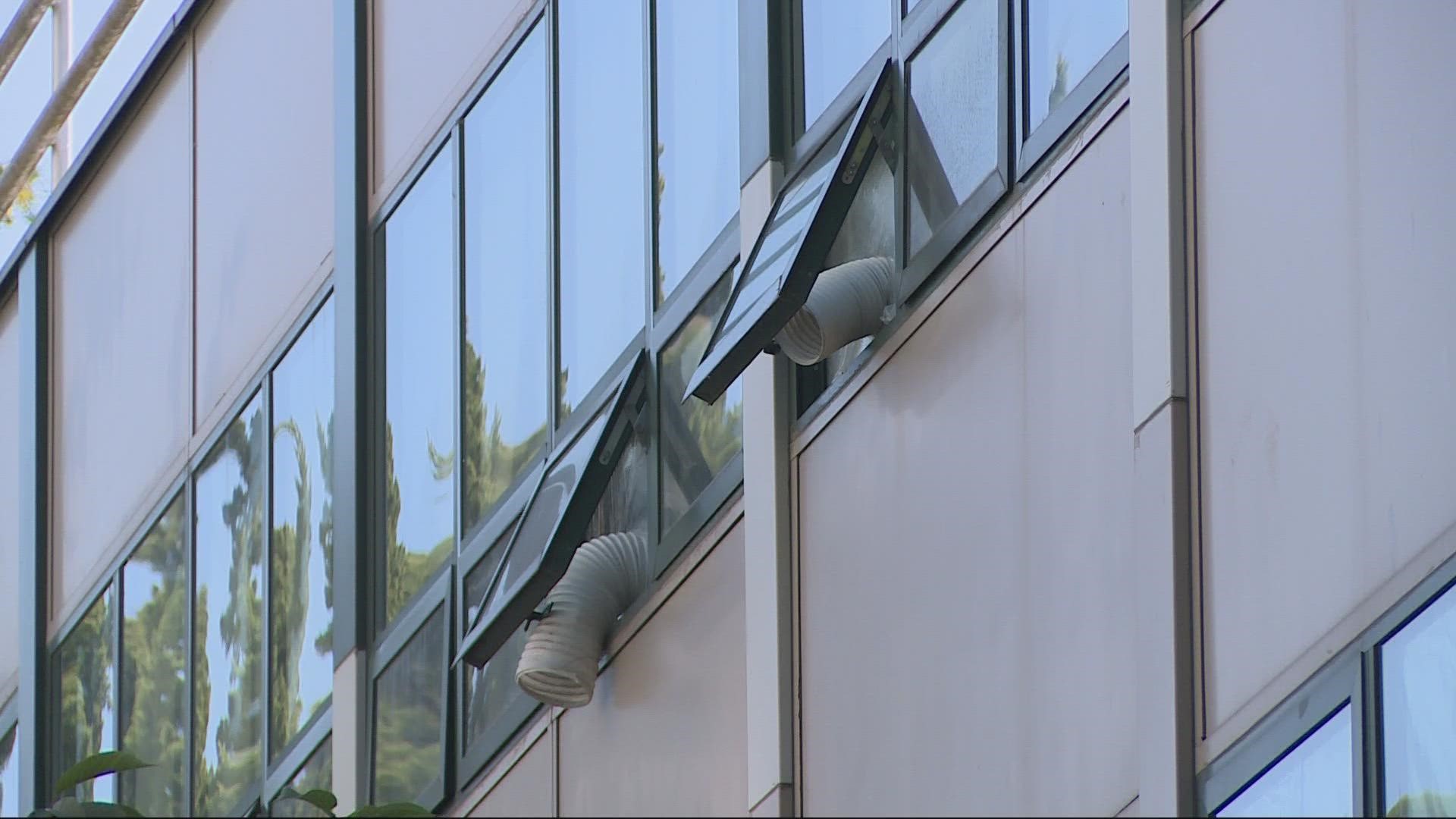PORTLAND, Ore. — The mayor of Portland, Oregon, warned the Pacific Northwest could see the most dangerous part of an extended heat wave this weekend as Portland and Seattle appear to be on track to break records for extended scorching temperatures.
As the Northwest nears the sixth day of an intense hot spell, Portland Mayor Ted Wheeler said the weekend marks a new phase that could pose “the highest risk to our most vulnerable community members.”
“We’re reaching the most important phase of this heat emergency,” Wheeler said Friday.
Temperatures have neared the triple digits in Portland the entire week, hitting a high of 102 degrees Fahrenheit (38.9 Celsius) on Tuesday. Forecasters predict temperatures could top 100 F (37.8 C) once again on Saturday.
On Friday the Oregon State Medical Examiner’s Office said it was investigating an additional possible heat fatality from suspected hyperthermia, bringing the total to five. The deaths were reported in Multnomah County, which is home to Portland, Umatilla County in the eastern part of the state, and Marion County, which includes the state capital Salem.
The deaths occurred Monday, Tuesday, Wednesday and Thursday. The state medical examiner’s office said the heat-related death designation is preliminary and could change.
The heat wave has lasted longer than forecasters initially predicted, prompting Multnomah County to extend an emergency declaration that was set to expire on Saturday through Monday morning.
“Earlier in the week we did not anticipate that it would be this long or this severe,” said Multnomah County Chair Deborah Kafoury.
The county’s four emergency overnight cooling shelters were at 70% capacity on Thursday with around 220 people spending the night, Multnomah County said in a statement. Kafoury said officials will “be watching very carefully” to see whether the shelters will need to remain open through Sunday night, “which we had not originally planned to do.”
Portland “will probably need additional capacity” over the weekend, said Shad Ahmed, director of the city’s Bureau of Emergency Management, adding that his office is “working to ensure that we have the logistics, supply and staffing necessary to address that.”
The National Weather Service has extended excessive heat warnings in Portland and Seattle through Sunday evening.
On Tuesday, Portland set a daily record of 102 F (38.9 C). Forecasters said the city appears to be on track to at least tie previous heat wave duration records, which currently stand at six consecutive days of 95 degrees or warmer.
“Sunday would break the record” if temperatures that day hit 95 degrees, said David Bishop, a meteorologist at the National Weather Service in Portland.
Seattle on Tuesday also reported a new record daily high of 94 F (34.4 C).
If temperatures rise above 90 F (32.2 C) through Sunday in Seattle, that would be six straight days of the mercury topping 90 — something forecasters say has never happened before in the city.
Courtney Lewis and Rylee Griffin were visiting Seattle this week during the hot snap.
“I mean it is nice, like to help get a tan. But it’s just hot. Very hot,” Griffin said.
Forecasters predict there will be no relief until Monday when cool air from the Pacific Ocean blows in.
Climate change is fueling longer heat waves in the Pacific Northwest, a region where weeklong heat spells were historically rare, according to climate experts.
Residents and officials in the Northwest have been trying to adjust to the likely reality of longer, hotter heat waves following last summer’s deadly “heat dome” weather phenomenon that prompted record temperatures and deaths.
About 800 people died in Oregon, Washington and British Columbia during that heat wave, which hit in late June and early July. The temperature at the time soared to an all-time high of 116 F (46.7 C) in Portland and smashed heat records in cities and towns across the region. Many of those who died were older and lived alone.
While the current heat wave will not see such high temperatures, it remains “very serious” nonetheless, said Andrea Hamberg, interim director of Environmental Health Services at the Multnomah County Health Department in Oregon.
“This heat event might not feel as severe as the June 2021 heat dome. But in many ways it is,” Hamberg said, warning of a scorching day six and a day seven that “is forecast to be even hotter.”
"To compound that risk, we are not getting the overnight lows our homes need to cool and our bodies need to recover,” said Hamberg. Forecasters predict the low in Portland Friday night will not dip below 70 F (21.1 C).
Due to the long duration of the heat spell, officials have urged residents to check in on people who are more at risk of heat-related illness, such as older people and those who live alone.
During the 2021 heat dome, 78% of those who died in Multnomah County were 60 or older, and 71% lived alone, Hamberg said. She added that 94% of people died in their own homes.
The heat wave stretches south into Northern California and Nevada, where records fell for the second day in a row Friday in Reno with a high of 104 F (40 C). Even in the mountains around Lake Tahoe above elevations of 6,200 feet (1,890 meters), South Lake Tahoe, California followed Thursday’s record-high of 92 F (33.3 C) with a high of 91 F (32.8 C) on Friday, tying the previous mark set in 1988.

